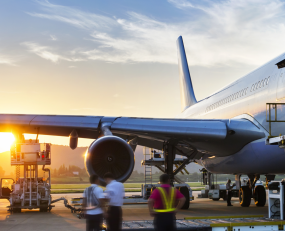
Many things are unusual about the coronavirus outbreak and the subsequent consequences of the virus. Some of the more peculiar images that have circulated the freight forwarding industry have been the images of passenger planes full of PPE and medical equipment as opposed to passengers jetting off on their summer holidays.
The coronavirus crisis highlighted the market’s dependence on passenger flights to transport cargo. Typically, 50-55% of air cargo is transported as belly-freight in passenger aircraft, which has experienced a near-complete halt in operations with 4.5m flights cancelled between the start of 2020 and June. As a result, 90% of global passenger fleet has been grounded, effectively eliminating 42% of industry-wide potential cargo capacity.
Despite travel restrictions easing it could be a while before flocks of tourists embark on summer holidays abroad. Booking websites including lastminute.com and Airbnb have predicted a spike in people opting for ‘staycations’ for the summer breaks this year as opposed to going abroad.
If this is to be the case and more people do choose to stay relatively local for their summer holidays for the foreseeable future, this will prolong the market’s recovery and send air freight rates soaring. Logistics providers already appear to be anticipating a lengthy recovery. Even as countries relax travel restrictions, most airlines are running a fraction of their usual routes and the industry does not expect to return to pre-pandemic levels until at least 2023. As a result, there is likely to be a significant shortage
In response to the capacity shortage, the air freight sector has converted passenger aircraft into freighters. Providers, such as Dachser and DSV Panalpina have also chartered flights, in attempts to address the lack of capacity in the market.
Though this is all well and good how sustainable is this approach? At some point passengers will be willing to travel via air again, freeing up capacity in the market. Chartered flights and the conversion of passenger flights have been good short-term solutions but are not financially viable in the long-term.
To avoid similar issues in the future the market will need to focus on becoming less reliant on passenger aircraft. Providers, such as DHL, who have relatively easy access to cargo planes via its Express division will have the opportunity to capture a larger market share. DHL has also highlighted that more passenger planes will be converted to cargo as operators look to sell older jets, particularly those who have fallen on hard times during the virus. Alternatively, there may be a shift towards combi freighters, combining passenger and cargo in the main cabin which would allow airlines to utilise their aircraft more effectively. Both options would present providers, particularly those that have invested in their fleets, with the chance to gain market share.
The coronavirus crisis has been a catalyst for change throughout many elements of the supply chain. It is clear from the crisis that the market’s reliance on passenger aircraft is unsustainable and drastic change is on the horizon.
Source: Transport Intelligence, June 25, 2020
Author: Beth Poole